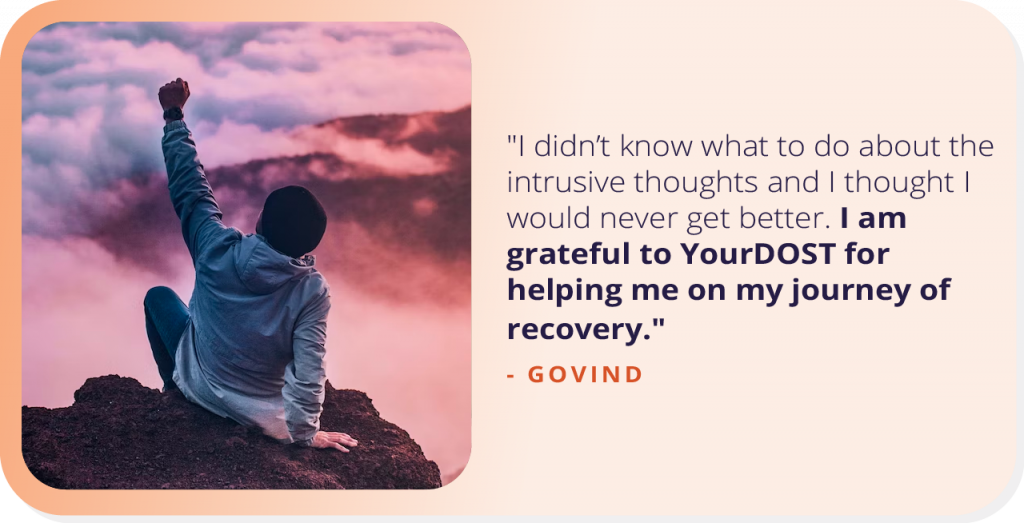
TW: Mention of Self-Harm.
From the city that’s a perfect blend of old-world charm and modern chaos, Delhi comes the protagonist of our story. Govind is a twenty-one-year-old, bright individual currently pursuing his BTech in Computer Science from Delhi Technological University.
Govind is an avid reader and loves to journal in his free time. A true literature lover, he particularly enjoys reading Indian Literature as well as books on philosophy.
“I’ve always been very introverted and kept a small circle of people around me. I spent most of my childhood studying and didn’t talk to many people.”

For most of his life, Govind found it difficult to initiate conversations with people, including his family. He kept to himself and did not open up about his problems to anyone else.
He immersed himself in his academics, and barely spent any time doing anything else. He says he only started to explore the outside world after he turned eighteen.
“The feeling of loneliness was constantly there. I felt sad that I couldn’t connect with friends the way most people my age did.”
Loneliness is like being in an echo chamber. The voices in your head feel magnified, and you feel like the only things listening to you are in the walls in your bedroom.
Govind mentions that these voices were intrusive thoughts that would drain any ounce of energy that he had.
“My first trigger was exams. I failed my entrance exams twice and had nightmares about studying.”
Apart from academic stress, Govind also mentions that he had a fear of abandonment. He had a falling out with one of his friends, which impacted him deeply for months.

“The loneliest moment in someone’s life is when they are watching their whole world fall apart, and all they can do is stare blankly.”
– F Scott Fitzgerald.
These painful experiences made Govind feel as if there was no light at the end of the tunnel. In the year 2021, Govind resorted to self-harm as a way of coping with his worries.
“I used to always have intrusive thoughts, and I was diagnosed with Recurrent Depressive Disorder and Anxiety. Things were looking horrible so I decided it was time to get professional help.’’
Govind thought that once he started his classes, he would be distracted from these problems and eventually they would go away. However, things didn’t pan out the way he hoped.
“I did not know who I could talk to about this. My parents were always supportive but I was too scared to tell them I was self-harming. When I first heard about YourDOST during my college orientation, I grabbed the opportunity to begin counseling.”

Govind’s decision to begin counseling changed his life. He started to notice positive changes within himself from the very first session he had.
“My counselor, Ms. Sharmili Ghosh, was such a great listener. She helped me open up about my intrusive thoughts and understand where they were coming from.”
Ms Sharmili provided Govind with several techniques to help him manage his anxiety, as well as cope with his tendencies of self-harm. He expresses his gratitude towards his therapist-
“I’m so grateful to Sharmili for helping me see that recovery is possible. For a long time, I thought my life would be the same forever. But she showed me that things will get better.”
From being self-kept his entire life, Govind has blossomed into someone who is not afraid of speaking out and being true to himself.
He is a lot more comfortable speaking to his parents about his mental health and has also made a conscious effort to make his friendships a priority.
Like a phoenix, Govind has flown from his lowest lows and risen into a more resilient, inspiring individual. He rates himself a 3.5 out of 5 in terms of feeling better, and is on an upward climb, striving to always work on himself.
Govind’s Warrior Tips:
1.”It’s okay not to be okay. However, you need to take charge of your life if you want things to get better.”
2.“Even if you think no one understands you, remember that help is always there. You just have to ask for it. ”

0 Commentaires